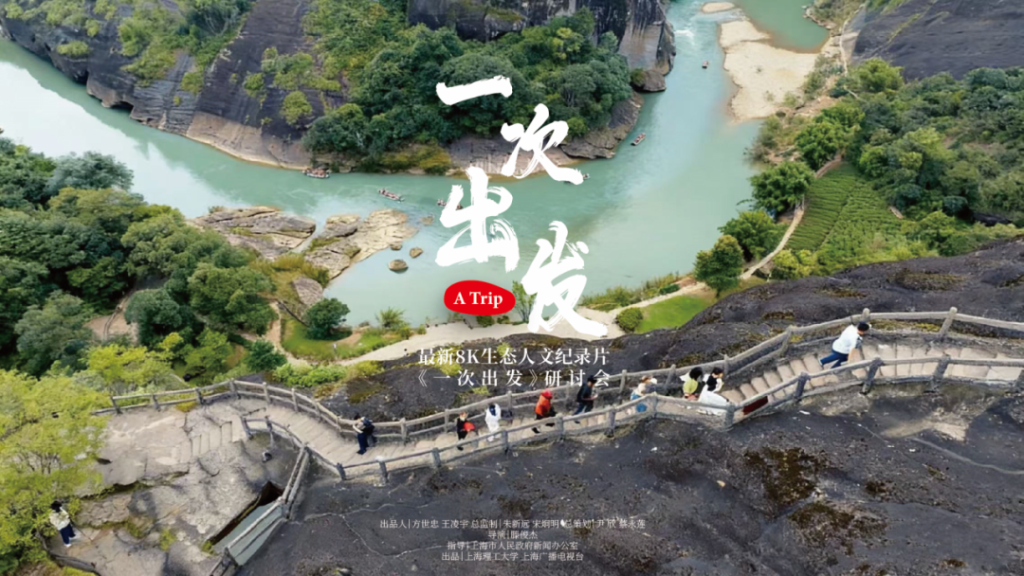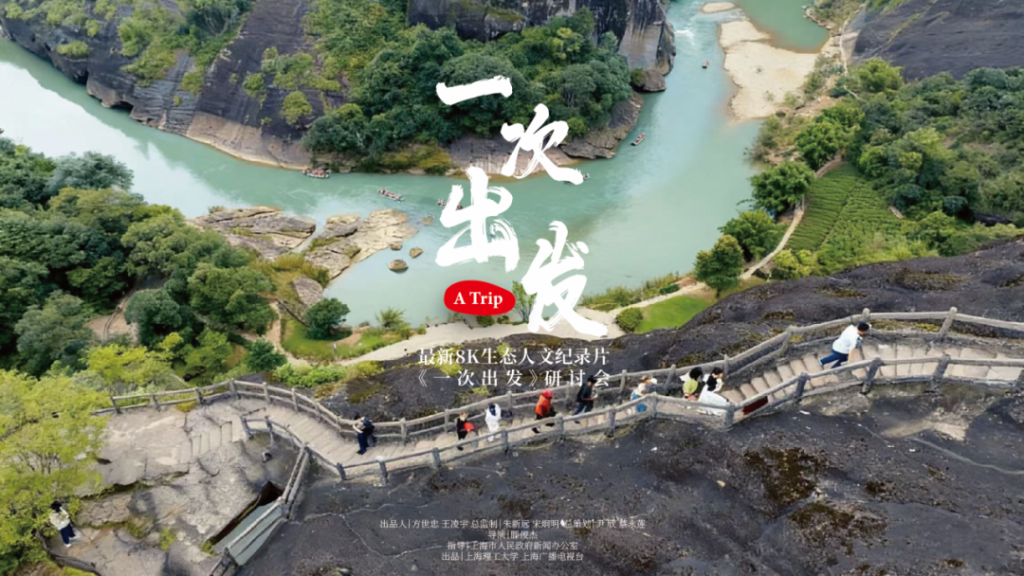
"Documentary films must have a soul, and the soul itself is simple and complex at the same time." At the 20th (Guangzhou) International Documentary Festival, Dutch director and producer Peter-Reem Dekron opened the master class this way.
Peter-Ream Declan began shooting news documentaries in 1991. He has continuously explored the relationship between man and nature, and based on this he has created many films with strong visual impact. He has won awards including the International Documentary Award in Amsterdam, the Netherlands. of more than 140 international film festival awards.
In this master class, Peter played several natural documentary film clips, whether it was using the church organ of Pelvom Island in the 17th century to imitate the spatial atmosphere of tides, or using human breathing to set off the rhythm of deep jellyfish, The industry audiences present were all impressed.
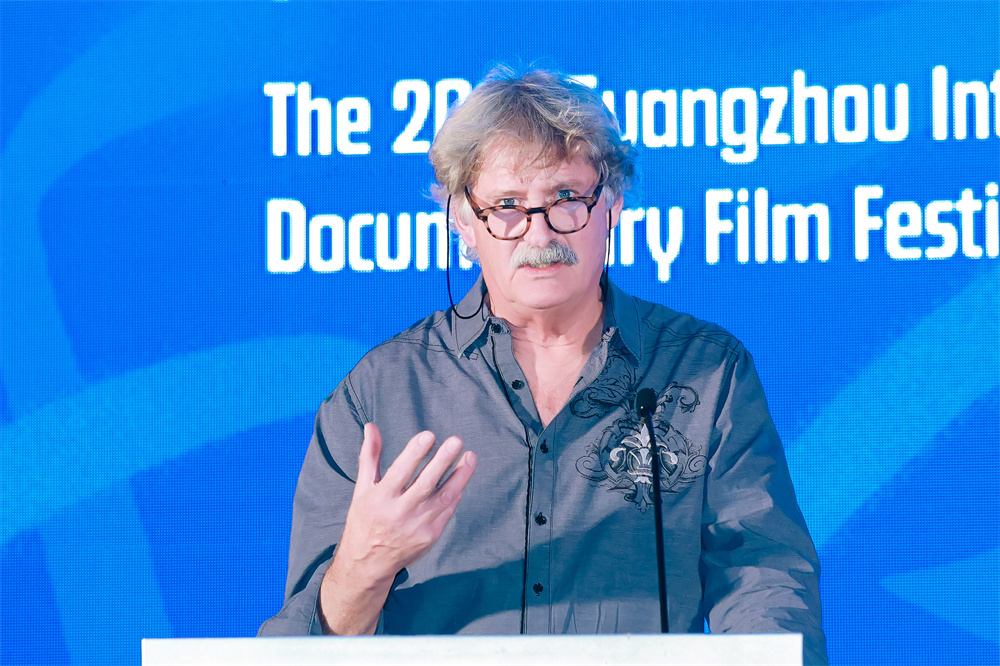
Peter-Ream Declan
Since "A Bite of China", more and more documentary practitioners have begun to realize the importance of sound and original music in documentary production. The industry has reached a general consensus that the earlier sound design enters the production process, the more effective it will be. achieve expectations.
"The chirping of birds, the sounds of nature before a storm... these can make you feel the hidden vitality in the sound, which is far more beautiful than the music created by humans."
Most documentary creators like to add music and narration to the picture, but Peter changed this method willfully. In "The Silence of the Tides" about the ecosystem, he believed that "breathing" is the theme and theme of the entire film. The tone, no narration, no music, the entry of natural sounds and human voices makes the picture look more interesting. "We also conveyed the essence and soul of the film through this breath. Between the breath of the tide, we portrayed the entire Wadden Sea environment."
Coincidentally, on December 7, at the "Sound - The Neglected Power" themed forum, guests discussed in depth the importance of sound directors, sound technology in documentaries, from collection to presentation, the necessity of original music and Features, how directors can effectively communicate with music, demonstration of AI singing voices, elaboration of aesthetic trends in documentary dubbing, and the impact of new technologies on the commentary industry, etc.
Post-production is not omnipotent, and neither is AI.
Ling Qing, a senior sound director for documentaries, took the lead in using a scene from the fourth season of "The World of Flavor" to point out: Post-production is not everything.
He emphasized that at the script stage, the sound director should work with the director to plan the key points of the sound, and let the director know which scenes cannot be recreated and which important sounds are completed together in the pre- and post-production recordings.

"Flavour World" Season 4 Poster
"In the early stage, you can use strong directional microphones and wireless microphones for recording. Strong directional microphones can be done by lifting a pole. Because of the local shooting method, it is easy to achieve by lifting a pole," Ling Qing said, citing "Flavour World" as an example. : "This project also used head recording and Dolby Atmos production for the first time in the early stage. At that time, two versions were made, one was the Atmos version and the other was the version in binaural mode. Before shooting, we also had to communicate with the pre-recording team To communicate, we mainly discuss how to better match the pre-recording and post-production sound, and how to make good use of the pre-recording and the head stereo microphone to capture better sound in the later stage. The advantage of the head stereo microphone is that it can capture information in the live environment. Giving more presence. In order to provide more sound details, we added additional 416 and Little Bee microphones to supplement the point sound source, so that during post-production, we can adjust the spatial sense and details of the sound according to the scene. Make adjustments.”
The theme forum "The Neglected Power of Voice" was so crowded that many documentary creators were even squeezed out of the gate. Many people stood and listened to the entire forum.
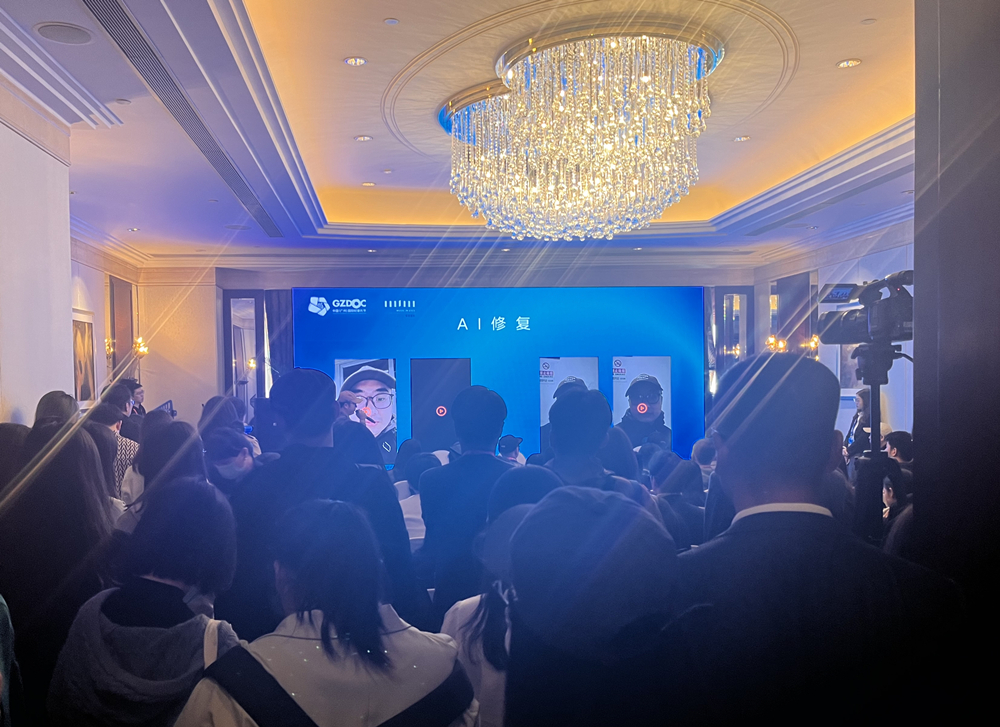
Audiences gathered at the forum.
In a scene of plants breaking through the ground and growing, the young buds are endowed with strong vitality. This is due to the sound director's use of a lot of foley. Through the post-recorded ventriloquism, there will be a change in the tone of the plant according to the movement of the plant, with different heights, sublimating every bending and straightening of the back of the plant as it grows.
Ling Qing believes that sound directors must do their homework. In addition to pulling film and collision, they must also ask some topics they want to know: For example, what does the food taste like? Is it sour or smelly? Wait, and then refine the audio-visual feel based on specific feelings.
For example, acidic foods will be displayed with some exciting and impactful music.
The fourth season of "Flavour World" has the least commentary, and whether the sound needs to be left blank is also the focus of discussion. Ling Qing believes that in a good film, the voices should complement each other.
Nowadays, platforms are diversified and video devices are also diversified. More and more people are accustomed to watching videos on their mobile phones. How should the sound of the documentary be presented on the mobile phone?
"We will conduct some experiments on mobile terminals to determine the effects of external amplifiers and headphones, and we will take all these aspects into consideration very carefully," Ling Qing added.
He concluded that what the main creator and team should do in terms of sound, first, the early intervention of the sound director, the second is the standardization of the work process, the third is the close contact between the pre-production and post-production, and the fourth is the relationship between the sound director and the director communication and collaboration.
Afterwards, sound effects engineer and mixer Shi Hanxiang showed everyone the sound recorded in the subway station and the corridor after AI repair. After the repair, the noise and echo were obviously gone, and the sound was clear and solid. However, Shi Hanxiang believes that in this repaired state, some environmental sounds still need to be added in the later stage, because it is not as real as the recorded interview environment. "The sound repaired by AI is particularly like finding a new recording studio to make up for the recording." of."
Therefore, if you want an immersive audio-visual effect, you cannot be lazy in sound design, you must brainstorm.
"We want plants to grow with its own special language. We developed a language during the filming of the movie "Avatar". For plants, can we also develop a special language of its own? In the end, we also We found a lot of materials, and many of the sounds were simulated with slime glue. We used many anthropomorphic methods to achieve the final sound effect. In the trailer for the fourth season of "Flavour World", we also used The grains give it a Star Wars feel." In addition, Shi Hanxiang also mentioned some tips when doing foley for animal documentaries.
Zhu Lexian, the executive producer of "Flavour World 4" and the producer of the first two seasons, recalled that the content that tortured the sound director the most was how to show southerners eating snails.
The snail is so small, what should I do? But the temptation of food must be created through sound shaping.
"We spent a lot of money to build a professional Atmos studio to make "Flavour World 1". At that time, we also hoped to make some breakthroughs. Sound breakthroughs are an important part. The production of Atmos brought a new challenge. Because it may take three times longer than ordinary stereo production, many teams may not be able to do it if they do not have sufficient funds.”
How to quickly find the original music style of your video
Domestic copyrighted music lacks integration and unification. Around 2000, China did not pay much attention to the copyright of original music, and audiences could often hear Sakamoto Ryuichi's music in many films. Talking about the importance of original music, music producer Liu Ying shared her creative experience with the audience from a practical perspective.
Near the end of the theme song of the CCTV variety show "Chinese Archeology Conference" there is an instrument with a very sharp high pitch and a bright tone. That instrument is the oldest musical instrument in the world - the bone flute. The bone flute became the key to this theme song.
The reason why he chose the bone flute, Liu Ying explained, is that in terms of content, it conforms to the very long and huge historical dimension of archaeology. In terms of time, it can also be used as the featured instrument of this piece. The electric guitar is the main melody played in the climax. One Chinese and one Western are combined to achieve a musical style that combines Chinese style, rock and electronic music.
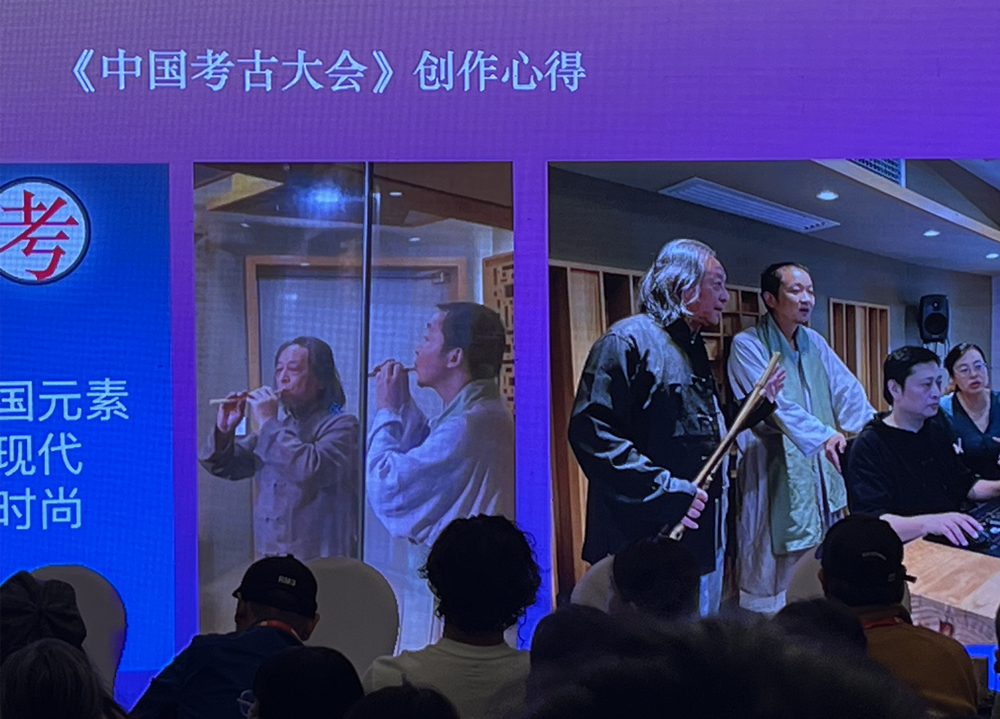
Forum site
Among the original music of another "Ancient China", there is a piece of music called "Mysterious Cool". The lead instrument Daruan imitates the playing method of the bass, and the flavor of combining Chinese and Western elements is also revealed.
"Music creation requires communication not only with the director, but also with the stage design, lighting, and color tones. All the content together determines the direction and positioning of the composition. In the initial creative stage of music, melody design, orchestration style, and paragraph structure design, these are all It needs to be taken into consideration, and then the communication between MID production and arranger, as well as the later instrument selection, communication between performers, recording engineers, mixers, etc. The birth of a piece of music is really the hard work of many people." Liu Ying said.
In addition to music, narration is also a key part of documentaries, and commentary plays a decisive role in Chinese documentaries. With the booming development of online documentaries, voices with "Internet sense" have gradually become the voices that directors are flocking to.
Mesozoic dubbing and recitation artist Zhou Yang is the official dubbing artist for CCTV's large-scale documentaries. You can hear his voice in many documentaries such as "Awesome, My Country", "Internet Era", "Story of Mountains and Seas", "A Hundred Years of Journey", etc. His dubbing The works performed have also won many awards at home and abroad and from CCTV. He feels that the director has "tortured him more and more" recently, and he is always looking for new ideas and changes in dubbing.
"The most important requirement is that you don't want to have a broadcasting tone, and you have to be simple, natural, and sincere. Simplicity, naturalness, and sincerity are also a magic weapon that I have adhered to in my creations for so many years, but it is quite difficult for us practitioners." Zhou Yang said, " After "A String of Life" came out, many food programs asked us to dub the voice, "Do you have a string of strings at home?" I said it was really impossible to do, how much smoking, drinking, and going How many times does it take KTV to build such a voice? We really can't do it, but we can feel the demands of this era. He hopes that your voice and expression will be more authentic and simple."

"A String of Life" Season 4 Poster
The common view in the industry is that the narrator should not be a person who disturbs the work, and the voice temperament and the temperament of the work must be highly consistent. The process of creation is the process of empathizing with the audience.
Zhou Yang believes that the narrator also needs to be able to tell stories. At the same time, he is also someone who can accurately convey information, attitude and tone. He is someone with a director's perspective.
At the scene, Isabel Riva, a producer who has won multiple Emmy Awards, shared with everyone the most advanced AI tools in the world: vocal synthesis. By inputting text and keywords, you can quickly and automatically synthesize music and adjust instruments and timbres. , creators can have their own coding and create their own cases...
Regarding whether he will be replaced by AI, Zhou Yang firmly said, "I'm not afraid." "After I record a video, Teacher Yan Dong and I can still have some drinks. Can the machine do it?"
Zhou Yang said frankly that instead of being overly afraid, it is better to optimize himself. He believes that in the future, 50% to 60% of voice dubbing may be replaced, but there is still a possibility of 30 to 40%. "We can just do those thirty or forty things. There was once a director who chose me instead of using a machine. I asked him why. He said that every time you finish recording, you can give us something new and unexpected. You just have to treat the voice actor as a creator and create together with him."
Wang Shijun, deputy director of Guangdong Radio and Television Station and Guangdong Satellite TV Channel, also holds the same view: "In the future, AI is likely to replace people in editing, dubbing, and music in many aspects. It can meet the basic requirements, and the remaining 20%, It’s related to the core of today’s forum, which is emotion. Sound has emotion.”
Talking about the experience of creating the commentary, Zhou Yang finally concluded, "I hope that my power can be ignored, just like a piece of sugar melting in water. What you drink is sweet water without thinking about the sugar. I also I wish I were water, and whatever container you give me, I will become whatever it is.”
Imagination is the first driving force in film production, and the creation of sound is no exception. No matter what new technology will develop into, everyone believes that the original intention, imagination, and emotion of documentary creators are indispensable.
